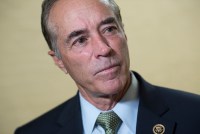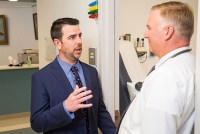Latest KFF Health News Stories
All Kids Should Be Screened for Obesity
An expert panel renews its guidelines that children and teens be screened for obesity at doctors’ offices and advised to receive treatment.
Survivors Of Childhood Diseases Struggle To Find Care As Adults
Once-fatal childhood diseases, like cystic fibrosis, congenital heart disease and sickle cell anemia, now can be survived into adulthood. But when those patients become too old to see pediatricians, it can be difficult for them to find physicians familiar with their conditions.
FDA Ruling On Aussie Biotech Could Boost Congressman’s Investment
Innate Immunotherapeutics, whose largest shareholder is Buffalo-area Rep. Chris Collins, received FDA approval to begin U.S. trials of its drug for treating advanced multiple sclerosis.
La nueva batalla contra la septicemia
Enfermeras especializadas se encargan de detectar la peligrosa infección a tiempo en pacientes hospitalizados, para prevenir desenlaces fatales.
Armed with strict guidelines and motivated by sheer urgency, a specialized team of nurses makes the rounds, seeking to thwart the No. 1 killer in U.S. hospitals.
Despite A Growing Appetite, Buffet-Style Flat-Fee Clinics Shutter In Seattle
A small number of medical practices have been moving to “direct primary care,” in which patients pay a monthly retainer for unlimited services. But the collapse of Qliance in Seattle may portend problems with the business model.
Exclusive: White House Task Force Echoes Pharma Proposals
Documents examined by Kaiser Health News shed light on the workings of the Trump administration’s “Drug Pricing and Innovation Working Group.”
Widow Unleashes Court Fight Against Scope Maker Olympus Over Superbug Outbreak
The Seattle case, the first to reach trial in the U.S., offers possible glimpse into fate of some two dozen lawsuits against manufacturing giant Olympus, accused of failing to address scope contamination linked to numerous deaths. The company faults poor hospital cleaning practices.
Tweet Revenge: Twitter Erupts As Diabetes Forum Tries To Lock Down Photo Sharing
This year’s American Diabetes Association scientific meeting came with a hefty price — a policy of no photography and limits on social media. That did not go over well on Twitter.
“¿Cuánto tiempo me queda, doctor?” Por qué muchos pacientes con cáncer no obtienen respuestas
Muchas veces los pacientes con cáncer no reciben respuestas adecuadas a preguntas críticas, entre ellas, la más crucial y universal de todas.
Medical Responses To Opioid Addiction Vary By State, Analysis Finds
The study also found that the largest percentage of medical coverage claims related to opioid abuse and dependence nationally come from older patients — those ages 51 to 60.
‘How Long Have I Got, Doc?’ Why Many Cancer Patients Don’t Have Answers
Due to poor doctor-patient communication, most people with advanced cancer don’t know enough about their disease to make vital decisions.
Quantity Over Quality? Minorities Shown To Get An Excess Of Ineffective Care
The researchers looked at 11 services that medical groups have said are often unnecessary and found that Hispanics and blacks got them at higher rates than whites.
If Insurance Market Crashes, Can Lawmakers Put The Pieces Back Together?
Actions by the Trump administration are putting pressure on the fragile market for individuals who buy their own coverage, but analysts say it should be able to rebound.
Former Pharma Reps’ New Mission: To School Docs On High Drug Costs
One insurer is turning the tables on drugmakers with what may be a new job category: a sales force for cost-effective medicine.
Daylight On Diabetes Drugs: Nevada Bill Would Track Insulin Makers’ Profits
With the cost of medications up 300 percent in the past decade, supporters see this as a first step to rein in prices.
When An Insurer Balks And Treatment Stops
A 22-year old man from Orange County, Calif., alleges in a lawsuit that his health insurer stopped paying for a crucial — and expensive — immunotherapy drug, leading him to become seriously ill. Treatments for patients with similar conditions are increasingly denied or interrupted, experts and patient advocates say.
Hospitals Now Tap Lawyers To Fulfill Patients’ Legal Needs
About 300 health care systems around the country have set up medical-legal partnerships to help patients who are dealing with legal problems that affect their health.
As Government-Funded Cancer Research Sags, Scientists Fear U.S. Is ‘Losing Its Edge’
More of the research studies being presented at the world’s largest annual gathering of cancer scientists comes from abroad.
Drug Rebates Reward Industry Players — And Often Hurt Patients
A new JAMA study examines how drug rebates can direct money to middlemen and force Medicare patients to cough up more money.
























